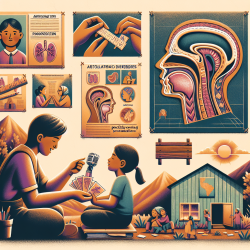Introduction
In the landscape of mental health services, ensuring timely and effective referrals is crucial, especially for youth. The research article "Youth Experiences With Referrals to Mental Health Services in Canada: Protocol for a Web-Based Cross-Sectional Survey Study" offers valuable insights into the referral processes and experiences of Canadian youth aged 17 to 30. This blog will explore the key findings of the study and discuss how practitioners can leverage these insights to enhance their referral processes and improve outcomes for young clients.
Understanding the Study
The study, conducted through a web-based survey, aimed to gather data on the experiences of youth with mental health service referrals across three Canadian provinces: Quebec, Ontario, and British Columbia. A total of 400 participants were recruited to provide both quantitative and qualitative data on their referral experiences, barriers faced, and opinions on using technology to facilitate the referral process.
Key Findings
The study highlighted several critical aspects of the referral process:
- Barriers to Access: Youth reported various barriers, including stigma, long wait times, and lack of knowledge about available services.
- Demographic Disparities: Certain demographic factors, such as rural residency and immigrant status, were associated with greater challenges in accessing mental health services.
- Technology as a Facilitator: Many participants expressed openness to using technology to facilitate referrals, suggesting a potential avenue for improving access and efficiency.
Implications for Practitioners
Practitioners can use these findings to refine their referral processes and enhance service delivery:
- Addressing Barriers: By understanding common barriers, practitioners can develop targeted strategies to reduce stigma and improve awareness of mental health services among youth.
- Leveraging Technology: Incorporating technology, such as online referral systems, can streamline the referral process and make it more accessible for youth, particularly those comfortable with digital platforms.
- Focusing on Demographics: Tailoring services to address the unique needs of different demographic groups can help reduce disparities in access and improve outcomes.
Encouraging Further Research
While this study provides valuable insights, it also highlights the need for further research into the referral experiences of youth. Practitioners are encouraged to engage in ongoing research and data collection to continually refine and improve mental health services. By participating in research initiatives or conducting their own studies, practitioners can contribute to a more comprehensive understanding of the challenges and opportunities in youth mental health care.
Conclusion
Improving referral processes for youth mental health services is a critical step in ensuring timely and effective care. By applying the insights from this study, practitioners can enhance their referral systems, reduce barriers, and ultimately improve outcomes for young clients. For those interested in delving deeper into the research, the original study can be accessed through this link: Youth Experiences With Referrals to Mental Health Services in Canada: Protocol for a Web-Based Cross-Sectional Survey Study.










